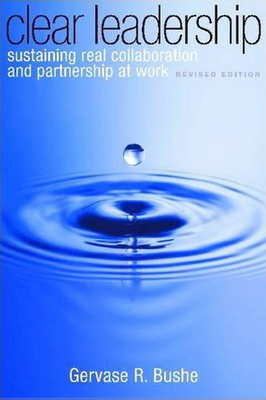Clear Leadership: Sustaining Real Collaboration and Partnership at Work, Revised Edition

I was pleased to find that a book devoted to helping people to communicate effectively and clearly was written very, very clearly. It was not pedantic or condescending; in it, the author seems to genuinely respect his audience. Refreshingly, the case studies and examples offered actually helped to illuminate the point and structure of the book—how rarely that happens!
Bushe identifies "interpersonal mush" as a key source of stagnation, frustration, and lack of direction and success in companies and organizations, and claims that people who contribute to producing this "mush" are unable to be effective leaders. By "mush," Bushe means the sedimented, collaborative misunderstandings, unfounded beliefs, unidentified fears and unarticulated desires that put people at cross-purposes. This "mush" both produces and is produced by a disintegration of communication and makes real collaboration nearly impossible.
When partners and colleagues are unclear about the distinction between thoughts, observations and feelings, they are unable to effectively communicate anything about these things. By inviting readers to reexamine these distinctions and to regain clarity about their own feelings, emotions, and judgments, Bushe positions his reader (and those who attend his seminars) to be able to clearly communicate these things in ways that are simple and effective.
Although this book (and his seminars) is largely targeted to organizations and businesses, many people could gain much from the exercises and explanations Bushe offers here. Intimate personal relationships, familial relationships, and friendships can all suffer from the stagnation and lack of deep understanding that can result when one or more parties stops actively paying attention to others, assuming that those with whom she is in relationship remain the same over time. It is easy to forget to seek out and appreciate the dynamism of our loved ones. Clarity about our own role in producing judgments and opinions as well as about the elements of experience can help to gently break down harmful patterns of relationship-momentum.
I can't speak much to the effectiveness of the exercises offered at the end of the four chapters devoted to the four aspects of the self that Bushe aims to help develop, as I did not do them. Some of them felt so very intimate for exercises meant to be done with a colleague or friend, but perhaps that might be because I am so used to varying levels of unclarity and mush that clarity feels almost uncomfortable.